From fashion to farming
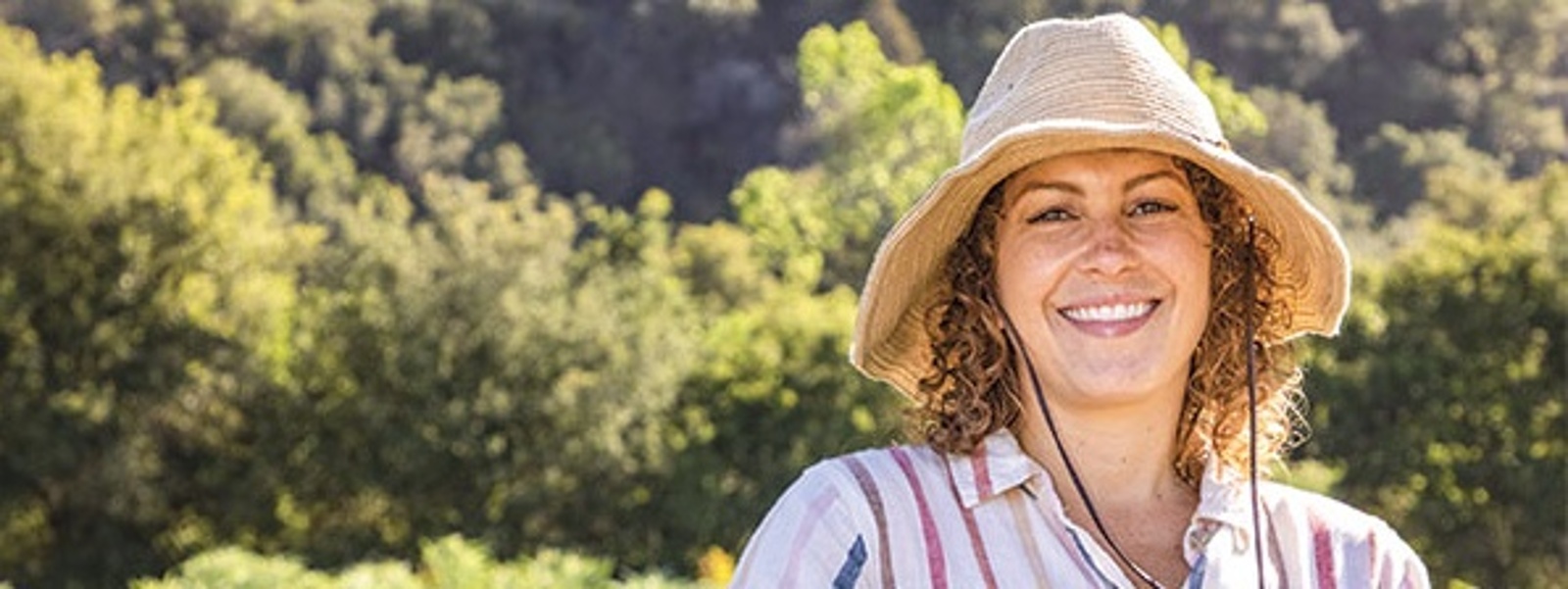
September/October 2022 California Bountiful magazine
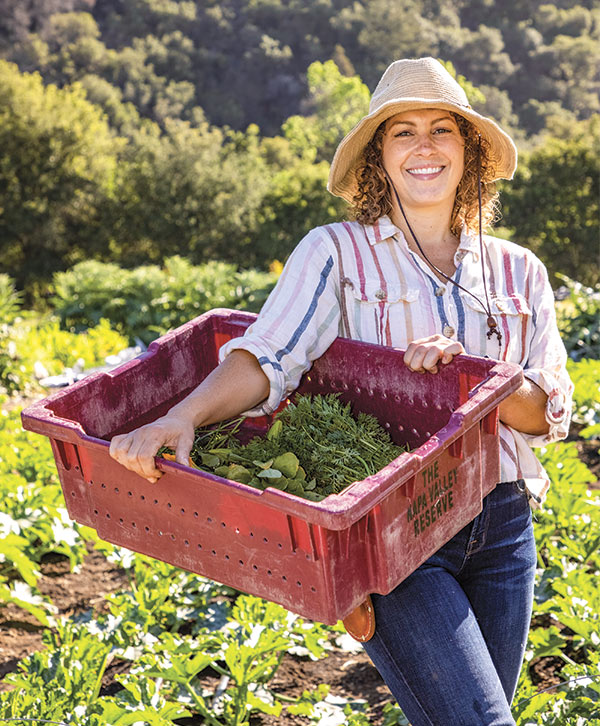
Woman trades big-city
career for a life in agriculture
Story by Cyndee Fontana-Ott
Photos by Lori Eanes
Lindsay DeRose’s career in corporate fashion provided a fast-paced lifestyle filled with international travel and glamorous clothes.
But her job today requires a love of the outdoors and a practical uniform of lightweight pants and long sleeves. The transformation in work clothes is just one sign of DeRose’s radical career leap from fashion to farming.
Today, this former fashionista is a part-time culinary farmer at Meadowood Napa Valley in St. Helena, a gardener at private homes and a volunteer at a church farm that supplies a food bank. DeRose makes far less money—$16 an hour as a farmhand compared to six figures annually as a Banana Republic product developer—but her life change was never about dollar signs.
She says she thinks she’s landed in just the right place: “I love working outside and I can’t imagine myself going back to behind a computer.”
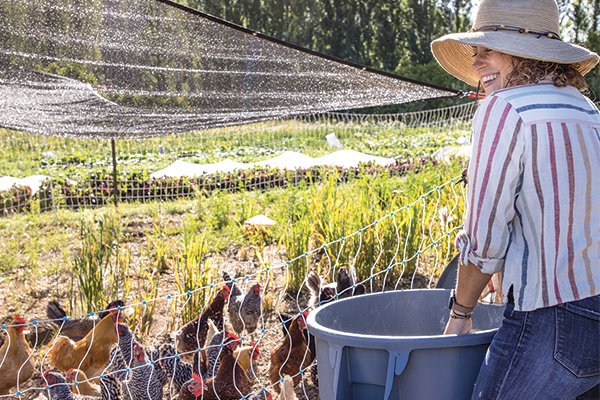
Part of a national trend
DeRose exemplifies a trend of people embracing farming as a second career arc. Across the country, and especially in California, organizations are working to recruit and support the next generation of farmers through mentoring, partnerships, specialized training, apprenticeships and more.
Jeanette Lombardo is executive director of the nonprofit Farmer Veteran Coalition, based in Woodland. It has a national membership of roughly 35,000 and helps those leaving military service transition into farming as a second career.
Military skills such as teamwork and logistics translate well into the agricultural sector. “All of this stuff is right up their alley, plus they have this mission-driven attitude—work until you get it done,” Lombardo says.
Marisa Alcorta, apprenticeship program manager at the nonprofit Center for Land-Based Learning in Woodland, has worked with veterans and others seeking a new career in agriculture. Those in the two-year program share a desire to feel useful, to work outside and to master the variety and pace of agriculture, she says.
“We need more farmers,” says Evan Wiig, director of membership and communications for the Community Alliance with Family Farmers. The nonprofit, based in Davis, works to build sustainable food and farming systems through policy advocacy and programs that create more resilient family farms, communities and ecosystems.
In part, Wiig points to the graying of the current generation—the average age of farmers nationally is 57.5; in California, it’s 59, according to the latest USDA statistics—while noting that “there are a thousand easier ways to make a living in the world.”
A former editor in New York who came to California in his 20s to work on a ranch, Wiig says agriculture has to attract more people. “We need to make sure that the basic practice of growing food is attractive not just to young people, but to smart, capable young people,” he says.
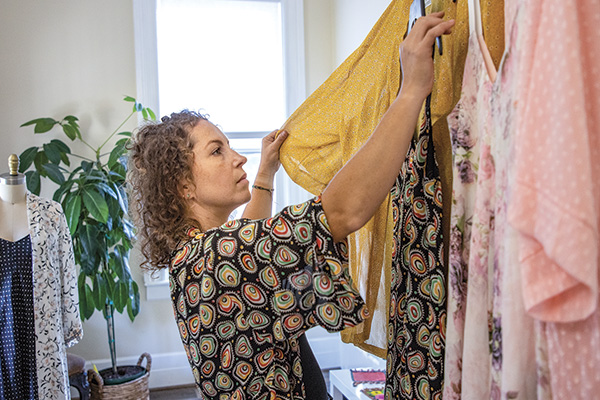
Pandemic triggers a change
Count DeRose among those building a second career in agriculture. She’s still in learning mode—understandable since her education and professional background relate to fashion.
DeRose grew up in south Florida, where her first career path seemed obvious even from a young age. “All of the women in my family always sewed,” she says. “When I was a kid, my mom made all of my clothes so I just grew up around it. It’s what I always wanted to do.”
She studied at Syracuse University in New York, graduating with a bachelor’s degree in fashion design in 2007, and eventually found her footing in the industry as a product developer. That’s the person who works between the designer and the factory to execute the designer’s vision against a backdrop of budget, timelines and quality control.
In roughly 10 years at Banana Republic, DeRose traveled the world—visiting China, Turkey, Vietnam and the Philippines, for example—and relocated to the West Coast with the brand. She even developed a collection of loungewear, Wonderose, but didn’t have much time to grow the line.
In California, she also developed a greater appreciation for the outdoors, saying “it just started seeping into me when I moved out here.”
Then COVID-19 hit. Professionally, everything changed—all the travel, all the in-person work with people abruptly stopped. DeRose was cooped up in her Oakland apartment, working remotely, and slowly realizing that this wasn’t the life she wanted.
“I was ready for a change prior to the pandemic,” she says. “But I didn’t think it would be this big of a change.”
In part, the pandemic allowed more soul-searching about the fashion industry and its negative impact on the environment. Waiting in line for groceries early in the pandemic, she recalls thinking that “if the food system breaks down and if everything is not available to us anymore, I’m screwed.
“I don’t know how to take care of myself; I don’t know how to live off the land. I’m a completely useless person in the end of the world,” she says she reflected. “That thought crossed my mind and that, coupled with sitting inside all the time, I just had this really innate urge to get my hands in the ground.”
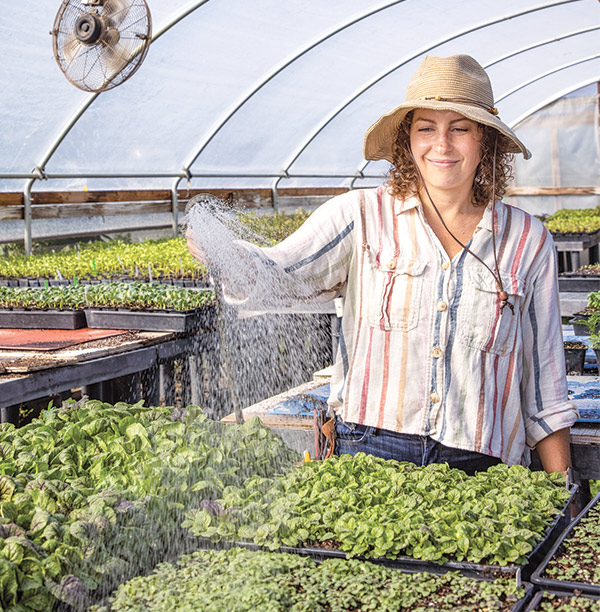
‘It’s fun for me’
A friend connected her to the Young Farmers & Ranchers Committee, a California Farm Bureau program, and a volunteer opportunity in Napa at The Mission Farm, which helps supply the Napa County Food Bank.
Soon, DeRose was renting a car and driving to the St. John’s Lutheran Church farm every Saturday. “I was doing whatever they needed help with,” she says, and that ranged from weeding and planting to bed prep and harvesting.
She was hooked. DeRose quit Banana Republic and moved to Napa, where she shares a house with a friend to save money. Though she flirted with another job in the fashion industry, she instead took a serious pay cut to work as a farmhand at Meadowood Napa Valley. The 3 1/2-acre culinary farm there grows unique, seasonal crops using organic and sustainable growing techniques.
“I’m still very much in the learning phase,” DeRose says. “With anything, it just takes time—living through the seasons and experiencing all the different things that can be thrown your way.”
But it doesn’t feel much like work, she says. “It’s fun for me and I really enjoy it. I hope to continue to do this as long as my body and the planet allows.”
Meanwhile, her friends are adjusting to her new career track—they call her “California Lindsay”—but appreciate the evolution (and the vegetables she frequently provides).
“The life that I lived in New York where I wore heels and dressed up and was kind of glamorous to now working in a field,” she says, “I think they were all about as surprised as I was at where I ended up.”
DeRose still hasn’t let go of all the clothes from her former life, including a box of “really beautiful” shoes that she can’t bear to part with—at least for now.
Her farm wardrobe, however, is a work in progress. “That was a whole new learning curve—having a set of clothes that I am OK with destroying,” DeRose says. “I’m still figuring it out.”
Cultivating the next generation:
Young Farmers & Ranchers
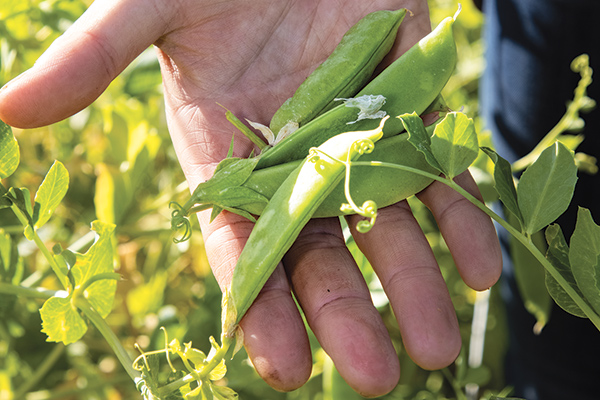
After Lindsay DeRose decided to explore the world of agriculture, she connected through the Young Farmers & Ranchers program, which helped her transition into farming.
Open to agriculturalists between the ages of 18 and 35, the California Farm Bureau program cultivates the next generation of leaders in agriculture and ag-related fields. For 75 years, YF&R has helped develop leadership skills through involvement at county, state and national levels of Farm Bureau. It offers opportunities for professional development, networking, advocacy and community involvement.
Today, there are YF&R programs representing 34 counties in California. For example, DeRose was connected to Napa County YF&R through a friend and, from there, to a volunteer opportunity with a church farm growing crops for the county food bank.
The experience fueled her passion for agriculture—a perfect outcome for YF&R and an industry looking to grow its ranks.
“The Farm Bureau is proud to support young people and their interests in agriculture,” says Stephanie Younger, YF&R program director. “By providing a network of like-minded individuals to help them succeed in their careers or explore new opportunities in agriculture, we are ensuring the future of growing food and other necessities in California.”

